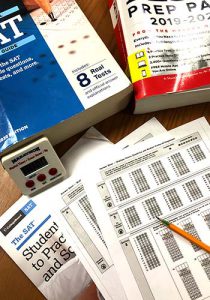High School Course Selection for College Admission
By Robin Farris
With college on the horizon, MMA freshmen, sophomores, and juniors need to be reminded that their course selections for high school will be of primary importance in the selective college admission process. Poor planning at this point could shut your son out when final cuts are made. Harder courses in high school will mean easier acceptance to college.
There are four key points to remember when it comes to your academic course selection:
• A student’s transcript should show a commitment to rigorous academics, escalating from year to year in academic difficulty and culminating in a senior year with at least four solid academic courses plus electives.
• Students should take the most demanding courses for which their teachers have recommended them.
• Selective colleges expect to see seniors stretching themselves academically to demonstrate their seriousness about college, to enhance their academic performance, and to assure their success at the college level.
• Students are strongly encouraged to exceed minimum graduation requirements with four years of mathematics and three years of foreign language. Clemson University, a moderately selective university, now requires three years of foreign language of applicants.
The following statements from Harvard University, University of San Diego, and Stanford University are very representative of the admissions evaluation processes at the most selective colleges and universities in the country:
Harvard University: At Harvard, there is no single academic path we expect all students to follow, but the strongest applicants take the most rigorous secondary school curricula available to them. An ideal four-year preparatory program includes four years of English, with extensive practice in writing; four years of math; four years of science: biology, chemistry, physics, and an advanced course in one of these subjects; three years of history, including American and European history; and four years of one foreign language.
Colleges understand there are differences in the overall strengths of secondary schools, most interested in how well applicants have taken advantage of available resources. The Admissions Committee recognizes that schools vary by size, academic program, and grading policies, so we do not have rigid grade requirements. They seek students who achieve at a high level, and most admitted students rank at the top of their graduating classes.
University of San Diego: Our first focus is on academic ability. USD seeks serious students, and those applying as freshmen are expected to present a well-balanced secondary school program of college preparatory courses in English, foreign language, mathematics, laboratory science, history, and social science. Since this is the most important single factor in the decision, serious candidates will challenge themselves with higher- level courses and strong academic course loads even in the senior year.
Stanford University: At Stanford, the thorough and elaborate evaluation process in which almost the entire admissions staff is involved each winter and spring cannot be reduced to a quantifiable formula. They attempt to blend the information contained in references with the data from academic credentials.
Academic Preparation for College
The primary criterion for college admission is academic excellence, and the most important single credential is the transcript. There are no minimum figures set for grade point average, test scores, or rank in class, nor are there specific high school course requirements for entrance to Stanford. They do, however, look for those students who have selected as rigorous an academic program as possible, and who have achieved distinction in a range of academic courses.
The ablest candidates have mostly “A’s” in their courses, but Stanford does find that some students with lower grade point averages may show more real promise for strong college-level course work. We also find that the same may apply with regard to test scores – very high scores; though they may in many cases confirm scholastic promise, do not guarantee admission to Stanford.
It is always to an applicant’s benefit to have taken the most demanding courses available in their high school. A strong performance in honors or Advanced Placement classes indicates a student’s ability and desire to meet academic challenges.
So, all that being said, the best gauge of how your cadet will do in college is his performance in high school. If he has pushed himself, colleges will note that. Robin Farris is the College Placement Officer at the Marine Military Academy.



